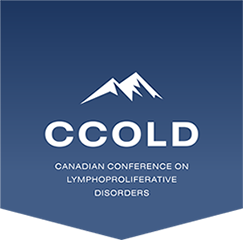WELCOME TO CCOLD 2026
Please join us for the 16th Annual Canadian Conference on Lymphoproliferative Disorders (CCOLD) taking place as a hybrid conference in Banff, Alberta on March 20 to 22, 2026.
CCOLD provides a unique opportunity for attendees to interact with international experts in the field of hematologic malignancies. The scope of this meeting will highlight both recent research findings elucidating the pathophysiology of these diverse diseases, as well as changes in therapeutic advances that have had a large impact in the management of our patients. As in previous meetings the format will be didactic presentations as well as case based panel discussions. There will be opportunity for audience participation via electronic polling with the entire faculty featured during the panel discussions.
Internationally known researchers in Lymphoproliferative Disorders will provide keynote lectures and their perspectives on optimal management.
We will continue to support the “Young Investigators Research Awards Program” which has been very successful in providing educational and research support to trainees interested in Lymphoproliferative Disorders. Posters outlining their research will be focused at a special reception Saturday afternoon.
We look forward to seeing you at this educational event!
Yours truly,
CCOLD Co-Chairs
Dr. Wendy Lam, Burnaby, BC
Dr. Laurie Sehn, Vancouver, BC
On behalf of the CCOLD Planning Committee
Dr. Anca Prica, Toronto, ON
Dr. Pamela Skrabek, Winnipeg, MB
Dr. Carolyn Owen, Calgary, AB
Dr. Darrell White, Halifax, NS
Dr. Nathalie Johnson, Montreal, QC
Dr. Irwindeep Sandhu, Edmonton, AB
Dr. Julie Stakiw, Saskatoon, SK
CALL FOR ABSTRACTS
YOUNG INVESTIGATORS RESEARCH AWARDS PROGRAM
Deadline for submission is is now CLOSED
The CCOLD Young Investigators Research Awards Program aims to provide educational and research support to trainees interested in the area of lymphoproliferative (including plasma cell) disorders. Trainees at any level, confirmed by letter of training from their program director, are eligible to submit an abstract of their work. Abstracts presented at previous meetings, but not in full publication, are allowed for submission.
All selected abstracts will be presented during a special Young Investigators Poster Session on the Saturday March 21st, 2026 afternoon/evening at the CCOLD meeting in Banff Springs, Alberta. Funding and registration will be provided for successful candidates. Funding is based on participant’s province.
ACCREDITATION
This event is an Accredited Group Learning Activity (Section 1) as defined by the Maintenance of Certification program of the Royal College of Physicians and Surgeons of Canada.
This activity was approved by the Canadian Association of Medical Oncologists for a maximum of 10.5 hours.
TARGET AUDIENCE
This meeting has been designed to meet the educational needs of hematologists, oncologists, general practitioners in oncology and other health care providers involved in the management of patients with lymphoproliferative and plasma cell disorders.
LEARNING OBJECTIVES
Highlighting both recent research findings elucidating the pathophysiology of these diverse diseases, as well as changes in therapeutic advances that have had a large impact in the management of our patients.
